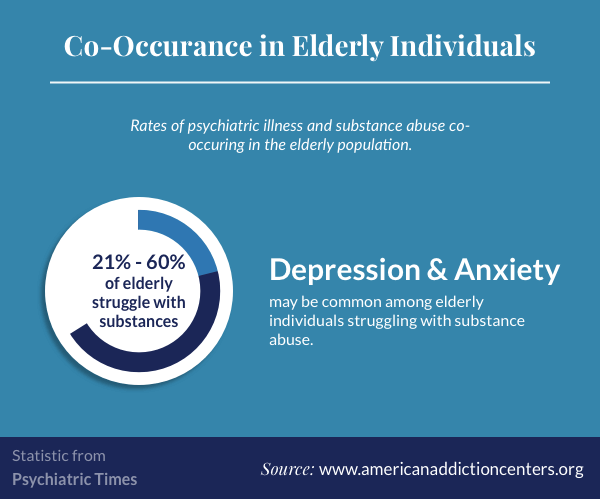Addiction Rehab for Seniors & Elderly Adults
Results from the 2018 National Survey on Drug Use and Health, conducted by the Substance Abuse and Mental Health Services Administration, show that 4.6 million Americans aged 65 years or older (8% of all seniors) reported a substance use disorder during the past year.1
Seniors struggling with addiction may face unique struggles, such as increased isolation, co-morbid health conditions, and more. This article will discuss addiction among seniors, health risks, and treatment options.
Identifying Substance Use and Addiction in the Older Population

It may not be as simple to recognize or diagnose a substance use or dependency concern in adults over the age of 65. This is partly due to possible social isolation. Seniors are often retired and no longer in the workforce; they may live alone or far from family members; and personal social circles may dwindle as peers pass away or become less ambulatory. People may hesitate to raise concerns about an elderly person’s substance use problem to risk potentially negatively impacting their quality of life.
However, alcohol and drugs present unique problems for the older adult population’s mental and physical health. As individuals age, physiological changes occur in the brain and body, making people more susceptible to, and less tolerant of, the effects of drugs or alcohol. Metabolism slows down, and medical complications may interfere with the way alcohol or drugs are broken down in the body. Future Medicine reports that substance use in older people increases the risk of:
- Falling and breaking bones.
- Becoming addicted.
- Suicidal thoughts and actions.
- Memory loss and possible delirium.
Certain effects of substance use and addiction may go unnoticed because they appear similar to complaints of aging, such as:
- Nagging physical pains.
- Trouble sleeping.
- Low energy.
Addiction may start innocently enough, as elderly individuals are likely not using drugs to get high, but rather may be using them to reduce physical pain or emotional difficulties. Senior citizens may struggle with the aging process and may use drugs or alcohol to cope with mental or physical distress related to:
- Illness
- Chronic pain.
- The death of a spouse or loved one.
- Social isolation.
- Decreasing ability to engage in some activities.
- Big life changes such as the loss of a job or change in living arrangements.
- Increasing psychiatric issues.

Some of the medications older adults may take are mind-altering and potentially addictive substances. Older adults may be more likely to take more medications for longer, to take more than one medication or supplement at a time, and to be prescribed long-term medications than younger individuals, the National Institute on Drug Abuse (NIDA) reports.
The Psychiatric Times estimates that around a quarter of all prescription drugs in the United States are sold to elderly people, and close to 11% of this population may misuse these medications. Psychoactive medications, including painkillers like opioids, and anti-anxiety or sedative medications, such as benzodiazepines, may be commonly prescribed to and misused by this population.
These substances make chemical changes in the brain and, over time, may lead to compulsive drug-seeking behavior, cravings, and a lack of control over drug use patterns, indicating that misuse may have developed into an addiction.
Fortunately, addiction is a disease that can be managed with the proper treatment.
Addiction Treatment Options for the Elderly & Aging
Addiction treatment facilities may offer various levels of addiction treatment for older adults, including medical detox, residential treatment, or outpatient treatment settings, as necessary.
When a comorbid illness is also present, integrated treatment models that use teams of medical and mental health professionals to treat both disorders simultaneously is important.
Medical Detox
Medical detox is a level of treatment in which patients are monitored and stabilized through the acute withdrawal process. Effective medical detox is performed in 3 phases:3
- Evaluation. This typically involves drug screening and ascertaining relevant information such as the patient’s general health concerns, living environment, history of substance use, and more.
- Stabilization. Patients are monitored through the withdrawal process to address health complications that may arise. If necessary medications may be administered to reduce the risk and severity of dangerous withdrawal symptoms.
- Fostering entry into continued treatment. Detox is largely ineffective in helping someone maintain sobriety over long periods of time without additional treatment to address the psychological and social components of their addiction.
Inpatient Treatment
Some facilities differentiate between inpatient treatment (provided in a hospital setting) and residential treatment (provided in a hotel-like environment). However, both are forms of rehab in which patients live at the treatment facility 24/7 benefitting from constant monitoring, strict routine, and around-the-clock access to treatment staff.
Evidence-based forms of treatment provided in these facilities may include:
- Behavioral therapy.
- Peer support programs and group counseling.
- Psychoeducation.
- Medications for substance use disorder.
Outpatient Treatment
Outpatient treatment utilizes many of the same treatment approaches used in inpatient/residential treatment but allow patients to remain living at home, visiting the facility at predetermined intervals for treatment. There are varying levels of outpatient treatment, including:3
- Partial hospitalization programs (PHPs), which are the most intensive, typically requiring patients to visit the facility 5 days a week for a weekly minimum of 20 hours. This level of care is sometimes referred to as “day treatment.”4
- Intensive outpatient programs (IOPs), which require patients to visit the facility a minimum of 3 days a week for a weekly minimum total of 9 hours.5
- Standard outpatient care, which allows the most flexibility in terms of scheduling.
Does Insurance Cover Rehab for Seniors?
Yes, most private insurers are required by the Affordable Care Act (ACA) to provide coverage for addiction treatment.6 Additionally, the Mental Health Parity and Addiction Equity Act (MHPAEA) mandates that the extent of their coverage must be equal to what the policy covers for other medical services.7
Adults over the age of 65 are enrolled in the federal Medicare insurance program. The benefits available also provide coverage for mental health and/or substance use treatment.
Addiction treatment can save families and individuals money in the long run, and many times Medicare or supplemental insurance can be used to help pay for the costs.
Recovery Support and Relapse Prevention

Support groups are often an essential part of a substance use treatment program and may be especially helpful after a more intensive treatment plan, or a stay in a residential program, has ended.
Relapse is a return to drugs or alcohol after ceasing use. The risk for a fatal overdose may be high during a relapse, since their body may have less tolerance to the drug than they had previously.
Self-help and 12-Step programs may have age-specific groups and meetings for older adults that can provide a safe haven and supportive peer network for individuals in recovery to help prevent episodes of relapse. A case manager who can check in with an elderly person regularly after leaving rehab, or a community-centered program, may be helpful to watch for signs of relapse. Friends and family members, and members of an elderly individual’s community, can all be important parts of a healthy support system that will enhance addiction treatment and promote long-term recovery.
Finding the Right Addiction Treatment Program
Addiction is a treatable disease, regardless of a person’s age. There are numerous substance use and mental health treatment options open to older individuals. Recovery is possible.
Call to speak to a compassionate admissions navigator at American Addiction Centers (AAC) and learn more about addiction treatment options or to start treatment today. You can also verify your insurance coverage using the confidential tool below.
